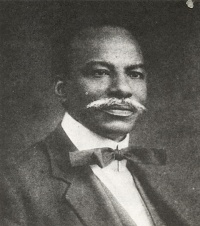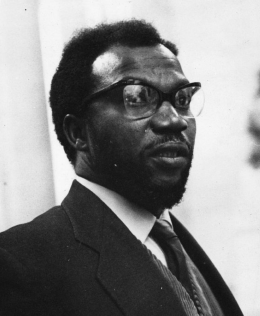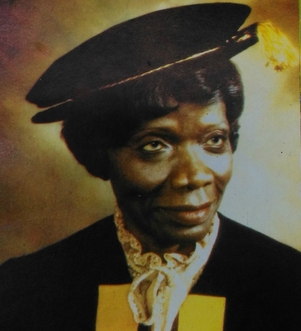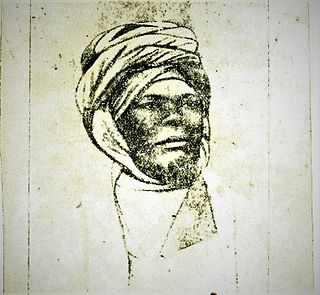Related Research Articles

Olayinka Herbert Samuel Heelas Badmus Macaulay was a Nigerian nationalist, politician, surveyor, engineer, architect, journalist, and musician and is considered by many Nigerians as the founder of Nigerian nationalism.

Odinigwe Benedict Chukwukadibia Enwonwu MBE, better known as Ben Enwonwu, was a Nigerian painter and sculptor. Arguably the most influential African artist of the 20th century, his pioneering career opened the way for the postcolonial proliferation and increased visibility of modern African art. He was one of the first African artists to win critical acclaim, having exhibited in august exhibition spaces in Europe and the United States and listed in international directories of contemporary art. Since 1950, Enwonwu was celebrated as "Africa's Greatest Artist" by the international media and his fame was used to enlist support for Black Nationalists movement all over the world. The Enwonwu crater on the planet Mercury is named in his honour.
Jacob Festus Adeniyi Ajayi, commonly known as J. F. Ade Ajayi, was a Nigerian historian and a member of the Ibadan school, a group of scholars interested in introducing African perspectives to African history and focusing on the internal historical forces that shaped African lives. Ade Ajayi favours the use of historical continuity more often than focusing on events only as powerful agents of change that can move the basic foundations of cultures and mould them into new ones. Instead, he sees many critical events in African life, sometimes as weathering episodes which still leave some parts of the core of Africans intact. He also employs a less passionate style in his works, especially in his early writings, using subtle criticism of controversial issues of the times.
Richard Beale Blaize was a Nigerian-Sierra Leonean businessman, newspaper publisher, financier, and black nationalist of Sierra Leonean and Nigerian heritage.
Oloye Sir Kofoworola Adekunle "Kofo" Abayomi was a Nigerian ophthalmologist and politician. He was one of the founders of the nationalist Nigerian Youth Movement in 1934 and went on to have a distinguished public service career. His last major public assignment was as chairman of the Lagos Executive Development Board from 1958 until 1966.

The CMS Grammar School in Bariga, a suburb of Lagos in Lagos State, is the oldest secondary school in Nigeria, founded on 6 June 1859 by the Church Missionary Society. For decades it was the main source of African clergymen and administrators in the Lagos Colony.

Nigerian nationalism asserts that Nigerians are a nation should promote the cultural unity of Nigerians. Nigerian nationalism is territorial nationalism and emphasizes a cultural connection of the people to the land, particularly the Niger and the Benue Rivers. It first emerged in the 1920s under the influence of Herbert Macaulay, who is considered to be the founder of Nigerian nationalism. It was founded because of the belief in the necessity for the people living in the British colony of Nigeria of multiple backgrounds to unite as one people to be able to resist colonialism. The people of Nigeria came together as they recognized the discrepancies of British policy. "The problem of ethnic nationalism in Nigeria came with the advent of colonialism. This happened when disparate, autonomous, heterogeneous and sub- national groups were merged to form a nation. Again, the colonialists created structural imbalances within the nation in terms of socio-economic projects, social development and establishment of administrative centres. This imbalance deepened the antipathies between the various ethnic nationalities in Nigeria ." The Nigerian nationalists' goal of achieving an independent sovereign state of Nigeria was achieved in 1960 when Nigeria declared its independence and British colonial rule ended. Nigeria's government has sought to unify the various peoples and regions of Nigeria since the country's independence in 1960.
Brazilians in Nigeria, Amaros or Agudas consist of the descendants of freed Afro-Brazilian slaves who left Brazil and settled in Nigeria. The term Brazilians in Nigeria can also otherwise refer to first generation expatriates from Brazil.

The Saro, or Nigerian Creoles of the 19th and early 20th centuries, were Africans that were emancipated and initially resettled in Freetown, Sierra Leone by the Royal Navy, which, with the West Africa Squadron, enforced the abolition of the international slave trade after the British Parliament passed the Slave Trade Act 1807. Those freedmen who migrated back to Nigeria from Sierra Leone, over several generations starting from the 1830s, became known locally as Saro(elided form of Sierra Leone, from the Yoruba sàró). Consequently, the Saro are culturally descended from Sierra Leone Creoles, with ancestral roots to the Yoruba people of Nigeria.

Sir Kitoye AjasaListen was a Nigerian lawyer and legislator during the colonial period. He was conservative, and worked closely with the colonial authorities. He thought that progress would only be possible if Africans adopted European ideas and institutions. Ajasa was one of the leaders of the People's Union, and was the founder of the conservative newspaper the Nigerian Pioneer. He was the first Nigerian to be knighted.
Richard Akinwande Savage (1874–1935) was a prominent physician, journalist and politician in Lagos, Nigeria during the colonial era.
John Randle was a West African doctor who was active in politics in Lagos, now in Nigeria, in the colonial era. Born in Sierra Leone, he was one of the first West Africans to qualify as a doctor in the United Kingdom. On return he worked for the Lagos Colony colonial medical service for a while, then left due to discrimination and built up a successful private practice, treating both Europeans and Africans. He co-founded the People's Union in 1908, a political association that sometimes opposed government measures. During World War I (1914–18) he was loyal to the British Empire. In post-war politics the conservative People's Union was not a serious competitor to the more radical Nigerian National Democratic Party.
Orisadipe Obasa,Listen M.D. was a Nigerian doctor and prince who played a significant role in the politics of Lagos in the first decades of the 20th century.
The People's Union was an association in Lagos, Nigeria created in 1908 to promote the welfare of the city's residents regardless of race or religion. Its leaders included educated and traditional elites. An early goal was to stop a project to bring piped water into the city. All residents would pay taxes to cover the costs, but the wealthy Europeans and Africans with piped houses would be the main beneficiaries. The union lost popular support when the educated elites accepted a compromise on the water project in 1915. The People's Union was revived to fight an election in 1923 and continued until 1928, but could not compete with the more populist Nigerian National Democratic Party (NNDP).
Oba Eshugbayi Eleko, alias "Eleko of Eko", was the Oba of Lagos from 1901 to 1925, and from 1931 to 1932. His father was Oba Dosunmu. Eleko's struggles and legal victory over the British colonial government symbolized the struggle between indigenous rights and colonial rule in Nigeria. The outcome of the "Eleko Affair" led to the Eleko's deposition as Oba and deportation to Oyo between 1925 and 1931, years that some historians now call the "interregnum years", and that saw the reigns of Oba Ibikunle Akitoye and Oba Sanusi Olusi.
Chief Candido Joao Da Rocha was a Nigerian businessman, landowner and creditor who owned Water House on Kakawa Street, Lagos Island, Lagos, and was the proprietor of the now defunct Bonanza Hotel in Lagos. He held the chieftaincy title of the Lodifi of Ilesa.

Chief Kofoworola Abeni Pratt Hon. FRCN was a Nigerian nurse who was the first black nurse to work in Britain's National Health Service. She subsequently became vice-president of the International Council of Nurses and the first black Chief Nursing Officer of Nigeria, working in the Federal Ministry of Health.

Chief Mohammed Shitta-Bey, alias Olowo Pupa, was the first titled Seriki Musulumi of Lagos. He was a prominent Nigerian Muslim businessman, aristocrat and philanthropist who was involved in commerce across Lagos and the Niger-Delta region. He was also a patron of the Shitta-Bey Mosque in Lagos, and served as a leader in the Lagos Muslim community until his death.
Chief Joseph Kosoniola Randle MVO MBE was a Nigerian businessman and socialite from Lagos. He was Chef de Mission of the Nigerian Olympic team to Melbourne and was connected to various public activities in Lagos. Randle was a social crusader and philanthropist who started the Nigerian arm of the Anti-Tuberculosis Society, a member of the Lagos Town Council and was a sportsman who was a trustee of a proposed National Stadium.
Charlotte Olajumoke Obasa was a Nigerian socialite and philanthropist. She was the daughter of the merchant R. B. Blaize and the wife of the physician Orisadipe Obasa.
References
- 1 2 3 4 5 6 Gwam, Lloyd (1968). "The Writings of Dr Moses Joao da Rocha". Ibadan: A Journal Published at University College. University of Ibadan (25): 41–43.
- ↑ David Killingray (Editor). (1994). Africans in Britain. Routledge. P.108
- ↑ Coombes, Annie E. 1994. Reinventing Africa: museums, material culture, and popular imagination in late Victorian and Edwardian England. New Haven: Yale University Press